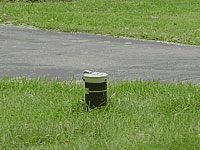 |
 Capacity Development Program Capacity Development Program
The Capacity Development Program aims to reduce existing public water systems in significant non-compliance with the Federal and State Safe Drinking Water Act regulations, and prevent formation and operation of any community or non-transient, non-community water systems that may be non-viable. It promotes or maintains water systems’ technical, managerial, and financial capacity in part by providing accurate, timely, and appropriate information.
The 1996 Amendments to the Federal Safe Drinking Water Act, Section 1420 (a), provide that each state shall have legal authority to ensure that all new public community water systems and public non-transient, non-community water systems demonstrate adequate technical, managerial, and financial capacity. In New Jersey, 1999 legislation (P.L.1999 Chapter 176) amended the New Jersey Safe Drinking Water Act (N.J.S.A. 58:12A) to give New Jersey explicit legal authority to require new community and non-transient non-community water systems to demonstrate capacity, implemented in a new rule at N.J.A.C. 7:10-13 effective August 21, 2000. The USEPA approved New Jersey's Capacity Development Strategy on September 28, 2000, which it has been implementing with the Drinking Water State Revolving Fund as its primary source of funding. The NJDEP is allowed to set aside up to 10% of each capitalization grant for State program management activities, which includes establishing and funding the Capacity Development Program.
Capacity Development Forms
Capacity Development publications
Small Water System Technical Assistance
This program helps public water systems serving less than 10,000 persons by 1) providing for free group training sessions, 2) conducting outreach site visits, and 3) conducting sampling that is not part of a system’s routine monitoring to detect problems or deficiencies that would otherwise go unnoticed. This was authorized by the 1996 Federal Safe Drinking Water Act, which required that States use 2% of their Federal capitalization grant from the Drinking Water State Revolving Fund to assist small water systems. Nearly two-thirds of about 600 public community water systems, and almost all of about 3,000 public non-community water systems, serve less than 10,000 persons, so there are about 3,400 small water systems in New Jersey.
DEP has contracted with the New Jersey Water Association (NJWA) to conduct free group training sessions in the Northern, Central and Southern Regions of New Jersey on such topics as Basic Accounting, Consumer Outreach, Distribution Planning and Safe Drinking Water Act Requirements, among other topics. NJWA is a non-profit association and a State affiliate of the National Rural Water Association; its membership is largely small water systems and therefore the training topics are mainly on issues affecting small water systems, but all are welcome at the training sessions. These training sessions also provide operators of small water systems with continuing education credit needed for license renewal. Registration information for training sessions is available at www.njwater.org or contact NJWA at (609) 242-7111.
BSDW-TA conducts free site visits, giving priority to public water systems (PWS) with:
- acute violations,
- monitoring and reporting problems or other Maximum Contaminant Level (MCL) violations, including all Significant Non-Compliers (SNCs--systems that have violated one or more National Primary Drinking Water Regulation(s) repeatedly over more than one monitoring period), and
- the smallest and/or poorest communities or Non-Transient, Non-Community (NTNC) water systems.
Site visits should include the following reviews: 1) system operation and maintenance; 2) certified operator status and provision of information on certified operator training; 3) system sampling schedule and sampling techniques; 4) guidance on specific compliance related water quality or treatment problems; 5) recommendations on financial records; 6) system's source and distribution system protection; 7) data required for issuing a Consumer Confidence report; 8) guidance in selecting appropriate technologies for small system needs; 9) guidance on SRF and other available financial assistance; and 10) recordkeeping. This program is voluntary and a water system may refuse assistance at any time, even one on the DEP priority list. If you wish to arrange a site visit, please contact (609) 292-5550. |